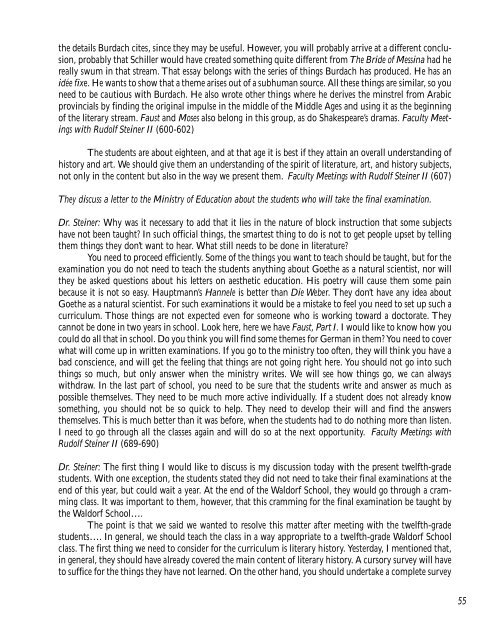Colloquium on English - Research Institute for Waldorf Education
Colloquium on English - Research Institute for Waldorf Education
Colloquium on English - Research Institute for Waldorf Education
Create successful ePaper yourself
Turn your PDF publications into a flip-book with our unique Google optimized e-Paper software.
the details Burdach cites, since they may be useful. However, you will probably arrive at a different c<strong>on</strong>clusi<strong>on</strong>,<br />
probably that Schiller would have created something quite different from The Bride of Messina had he<br />
really swum in that stream. That essay bel<strong>on</strong>gs with the series of things Burdach has produced. He has an<br />
idée fixe. He wants to show that a theme arises out of a subhuman source. All these things are similar, so you<br />
need to be cautious with Burdach. He also wrote other things where he derives the minstrel from Arabic<br />
provincials by finding the original impulse in the middle of the Middle Ages and using it as the beginning<br />
of the literary stream. Faust and Moses also bel<strong>on</strong>g in this group, as do Shakespeare’s dramas. Faculty Meetings<br />
with Rudolf Steiner II (600-602)<br />
The students are about eighteen, and at that age it is best if they attain an overall understanding of<br />
history and art. We should give them an understanding of the spirit of literature, art, and history subjects,<br />
not <strong>on</strong>ly in the c<strong>on</strong>tent but also in the way we present them. Faculty Meetings with Rudolf Steiner II (607)<br />
They discuss a letter to the Ministry of Educati<strong>on</strong> about the students who will take the final examinati<strong>on</strong>.<br />
Dr. Steiner: Why was it necessary to add that it lies in the nature of block instructi<strong>on</strong> that some subjects<br />
have not been taught? In such official things, the smartest thing to do is not to get people upset by telling<br />
them things they d<strong>on</strong>’t want to hear. What still needs to be d<strong>on</strong>e in literature?<br />
You need to proceed efficiently. Some of the things you want to teach should be taught, but <strong>for</strong> the<br />
examinati<strong>on</strong> you do not need to teach the students anything about Goethe as a natural scientist, nor will<br />
they be asked questi<strong>on</strong>s about his letters <strong>on</strong> aesthetic educati<strong>on</strong>. His poetry will cause them some pain<br />
because it is not so easy. Hauptmann’s Hannele is better than Die Weber. They d<strong>on</strong>’t have any idea about<br />
Goethe as a natural scientist. For such examinati<strong>on</strong>s it would be a mistake to feel you need to set up such a<br />
curriculum. Those things are not expected even <strong>for</strong> some<strong>on</strong>e who is working toward a doctorate. They<br />
cannot be d<strong>on</strong>e in two years in school. Look here, here we have Faust, Part I. I would like to know how you<br />
could do all that in school. Do you think you will find some themes <strong>for</strong> German in them? You need to cover<br />
what will come up in written examinati<strong>on</strong>s. If you go to the ministry too often, they will think you have a<br />
bad c<strong>on</strong>science, and will get the feeling that things are not going right here. You should not go into such<br />
things so much, but <strong>on</strong>ly answer when the ministry writes. We will see how things go, we can always<br />
withdraw. In the last part of school, you need to be sure that the students write and answer as much as<br />
possible themselves. They need to be much more active individually. If a student does not already know<br />
something, you should not be so quick to help. They need to develop their will and find the answers<br />
themselves. This is much better than it was be<strong>for</strong>e, when the students had to do nothing more than listen.<br />
I need to go through all the classes again and will do so at the next opportunity. Faculty Meetings with<br />
Rudolf Steiner II (689-690)<br />
Dr. Steiner: The first thing I would like to discuss is my discussi<strong>on</strong> today with the present twelfth-grade<br />
students. With <strong>on</strong>e excepti<strong>on</strong>, the students stated they did not need to take their final examinati<strong>on</strong>s at the<br />
end of this year, but could wait a year. At the end of the <strong>Waldorf</strong> School, they would go through a cramming<br />
class. It was important to them, however, that this cramming <strong>for</strong> the final examinati<strong>on</strong> be taught by<br />
the <strong>Waldorf</strong> School….<br />
The point is that we said we wanted to resolve this matter after meeting with the twelfth-grade<br />
students…. In general, we should teach the class in a way appropriate to a twelfth-grade <strong>Waldorf</strong> School<br />
class. The first thing we need to c<strong>on</strong>sider <strong>for</strong> the curriculum is literary history. Yesterday, I menti<strong>on</strong>ed that,<br />
in general, they should have already covered the main c<strong>on</strong>tent of literary history. A cursory survey will have<br />
to suffice <strong>for</strong> the things they have not learned. On the other hand, you should undertake a complete survey<br />
55

















